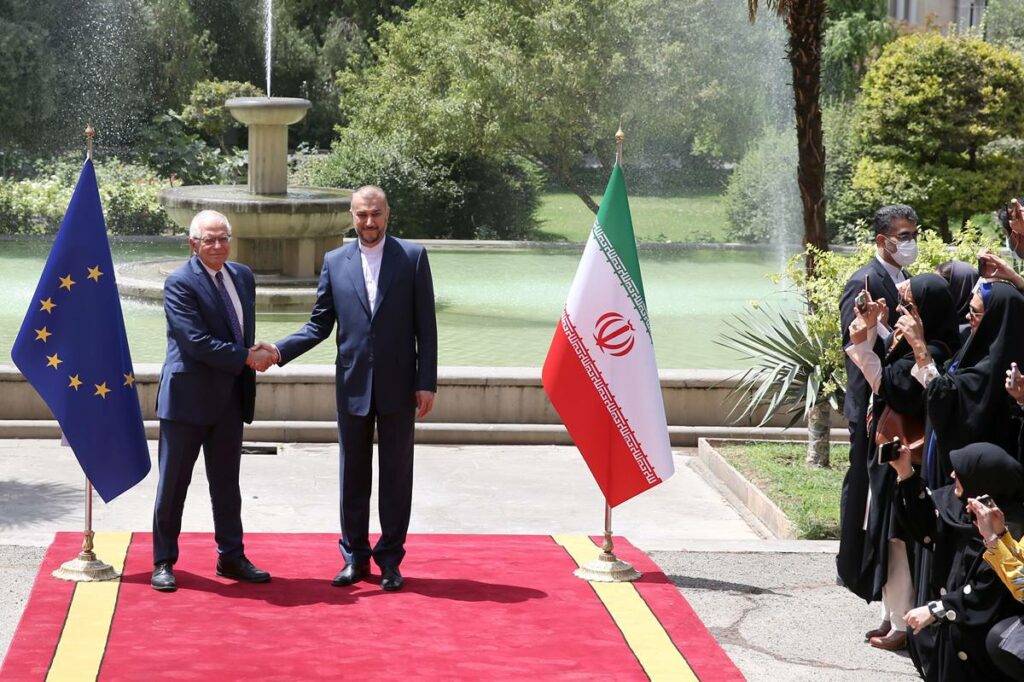The EU High Representative for foreign affairs, Josep Borrell, presented last week a final compromise proposal for a return to the nuclear deal with Iran from with the US under former president Trump withdrew in 2018.
The nuclear deal, or the Joint Comprehensive Plan of Action (JCPoA), signed in 2015 between Iran on the one side and the US, Russia, China, the UK, France and Germany on the other side, aimed at curbing Iran’s nuclear programme at least until 2030 and preventing it from developing nuclear weapons in exchange for the lifting of economic sanctions.
In 2018, the Trump administration unilaterally withdrew from the agreement, encouraged by the Netanyahu government in Israel, and reimposed the sanctions on Iran. This had the opposite effect on Iran, which weathered the sanctions, resumed the enrichment of uranium up to the level of 60 % or more and by now has shortened the time to develop a nuclear weapon to a number of weeks.
After Joe Biden was elected to US president, the talks on restoring the nuclear deal were resumed in Vienna in June last year. They have continued until now with some interruptions. As previously reported, the talks are coordinated by EU’s foreign policy chief who last Monday presented a compromise proposal. He expects to receive a response from the concerned parties very soon.
His spokesperson, Peter Stano, told The Brussels Times that the compromise is basically about a return to the full delivery of the JCPoA - the lifting of US sanctions and, by Iran, the stopping and undoing of the steps that it has taken since US’s withdrawal and that have led it to exceed the limits prescribed in the JCPoA as regards enrichment and other nuclear activities.
Iran’s official news agency (IRNA) said on Friday that Iran might accept the proposal. According to the agency, quoting an unidentified Iranian diplomat, “The EU’s proposals are acceptable provided that they provide assurances to Iran on various points, related to sanctions and safeguards,” as well as pending issues on inspection with the International Atomic Energy Agency (IAEA).
In particular, Iran wants assurances from the US that another American administration will not withdraw from the new deal and impose sanctions again as Trump did.
A crucial issue in a new deal is the so-called sunset clauses – the dates when Iran’s obligations will expire. EU’s former High Representative Federica Mogherini, who played a major roll in facilitating the original deal in 2015, underestimated the importance of the sunset clauses. After the American withdrawal, she even denied that they even existed.
Will the sunset clauses be deleted or extended?
Asked whether the compromise proposal deals with the sunset clauses and their extension, Peter Stano, the EU spokesperson, declined to clarify the issue and referred to diplomatic confidentially.
“We don’t comment nor speculate publicly on what might be in the text or not and why until the parties involved had the chance to study it properly in their capitals and take a political decision on whether they’ll accept the proposal or not,” he replied.
“The text reflects everything that could be negotiated regarding the JCPoA,” he added. “High Representative Borrell, as the coordinator of the agreement, sees it as the best possible proposal integrating all the different positions and as a text on which consensus can be reached.”
Riccardo Alcaro, an expert on EU and the nuclear deal and research coordinator and head of the Global Actors Programme of the Istituto Affari Internazionali, told The Brussels Times that the EU and the E3 (France, Germany and the UK) were fine with the sunset clauses in the original deal which they had negotiated in 2014 – 2015.
“Of course, they would like to extend them, but as part of a follow-up on the current negotiation,” he added. “They haven’t said that openly but clearly, they must agree to it. It would involve another round of give-and-take, whereby Iran would extend the sunset clauses in return for more in return than is on the table in the JCPoA."
However, this seems to be a moot point now, according to Alcaro. The urgency is to return to the JCPoA and gain some years during which Iran’s nuclear program would be checked and under severe inspection mechanisms.
“The longer and stronger agreement US president Biden said he wanted is something that only can be discussed after the JCPoA has entered into force and worked properly for some time. As of now, there is much uncertainty whether the JCPOA will be restored so there is little chance that a JCPOA+ will ever happen.”
As for the extension time, he assumes that it would go from a minimum of five more years to a maximum of ten.
While it is still uncertain whether the US and Iran will accept the EU compromise proposal, Israel is adamant on that a deal which preserves the sunset clauses is a bad deal and not acceptable from its point of view.
“The Europeans are desperate to end the negotiations with Iran on the nuclear issue as soon as possible to be able to import Iranian oil and resume business with Iran,” explained Professor Efraim Inbar, President of the Jerusalem Institute for Strategy and Security. “It’s a cynical approach by the EU High Representative. He seems ready to sacrifice Israel and other friendly states in the region.”
“Without a long-term extension of the sunset clauses, the renewed JCPoA is a farce,” he concluded.
M. Apelblat
The Brussels Times

